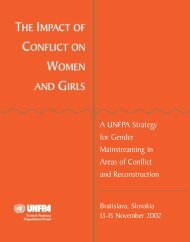Sexual exploitation and abuse by UN peacekeepers - PeaceWomen
Sexual exploitation and abuse by UN peacekeepers - PeaceWomen
Sexual exploitation and abuse by UN peacekeepers - PeaceWomen
Create successful ePaper yourself
Turn your PDF publications into a flip-book with our unique Google optimized e-Paper software.
34<br />
Carlyn van der Mark<br />
Political Science Master Thesis - <strong>Sexual</strong> <strong>exploitation</strong> <strong>and</strong> <strong>UN</strong> <strong>peacekeepers</strong><br />
One of the problems in determining the failure or success of a zero tolerance policy is the<br />
issue of accountability. To prevent future allegations of sexual <strong>exploitation</strong> <strong>and</strong> <strong>abuse</strong> from<br />
occurring <strong>by</strong> U.N personnel, there must be a greater measure of accountability towards the<br />
U.N personnel‟s actions. The situation of sexual <strong>exploitation</strong> <strong>and</strong> <strong>abuse</strong> appears to have<br />
become a “zero-compliance with zero tolerance” (Clayton, Bone, Dec 23 2004). Instances of<br />
sexual <strong>exploitation</strong> appear to have been engulfed in a “wall of silence” that is promoted<br />
through a militarized masculine culture (Defeis, 2008, p.8). However, it is not only this wall<br />
of silence that enables military personnel to escape punishment for their actions; the fact that<br />
military personnel have immunity creates an obstacle in addressing allegations of sexual<br />
<strong>exploitation</strong> <strong>and</strong> <strong>abuse</strong>.<br />
This section will explore the legal provisions for addressing sexual <strong>exploitation</strong> <strong>and</strong> <strong>abuse</strong><br />
<strong>and</strong> the limitations in addressing a zero tolerance policy. The variable accountability <strong>and</strong><br />
domestic law will be explored in indicating a failure of the zero tolerance policy. This section<br />
will deepen into the implementation difficulties in holding troop contributing countries<br />
accountable with regards to allegations of sexual <strong>exploitation</strong> <strong>and</strong> <strong>abuse</strong>. One of the factors<br />
that indicate why implementation of legal provisions are hard to administer is the cultural<br />
differences in what constitutes sexual <strong>exploitation</strong>. The indicator that is chosen to measure a<br />
culture aspect is the age of consent for sex <strong>and</strong> legality of prostitution.<br />
This section will test hypothesis II. Hypothesis II argues that with more accountability<br />
measures that are implemented, then the greater the decrease in sexual <strong>exploitation</strong> <strong>and</strong><br />
<strong>abuse</strong>. What is expected to be measured is that if there are more measures of accountability<br />
directed at U.N personnel, then there will be fewer allegations. The reasoning behind this<br />
hypothesis is that perpetrators of sexual <strong>exploitation</strong> <strong>and</strong> <strong>abuse</strong> will not feel that they have<br />
impunity for the crimes they have committed.<br />
2.1 The <strong>UN</strong> <strong>and</strong> legal provisions<br />
To underst<strong>and</strong> <strong>and</strong> to test the accountability measures, this section will first elaborate on the<br />
legal provisions that are set forth <strong>by</strong> the U.N with regards to sexual <strong>exploitation</strong> <strong>and</strong> <strong>abuse</strong>.<br />
Outlining the legal provisions will indicate the difficulties associated with implementing<br />
accountability.<br />
<strong>Sexual</strong> <strong>exploitation</strong> <strong>and</strong> <strong>abuse</strong> violate universally recognized international legal norms <strong>and</strong><br />
st<strong>and</strong>ards. Such behavior is seen as unacceptable <strong>and</strong> prohibited conduct for United Nations




![IANSA [PDF, 2MB] - PeaceWomen](https://img.yumpu.com/25206379/1/190x123/iansa-pdf-2mb-peacewomen.jpg?quality=85)
![Commitments Sample [PDF, 93KB] - PeaceWomen](https://img.yumpu.com/25206331/1/190x245/commitments-sample-pdf-93kb-peacewomen.jpg?quality=85)










![A Toolkit for Advocacy and Action [PDF, 260KB] - Peace Women](https://img.yumpu.com/25205989/1/190x245/a-toolkit-for-advocacy-and-action-pdf-260kb-peace-women.jpg?quality=85)